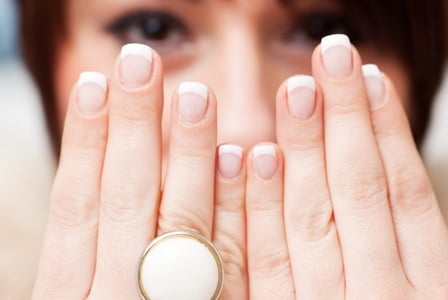
Our nails play an essential role in our everyday life, but most of us pay little attention to them. They may be worth a closer look, though, since they can be a strong indicator of our overall health.
Considering how efficient they are as finger helmets, itch scratchers, or penny picker-uppers, most of us pay surprisingly little attention to our fingernails—and considering how good they are at letting us know about our overall health, we might want to start looking a bit more closely.
Yellowish, thick nails
Nails can turn yellow for any number of reasons, ranging from mild causes such as stains to more serious concerns such as diabetes. When the discolouration is accompanied by thickening or crumbling of the nail, and if it only affects one or a few of your nails, then the issue at hand is more likely to be a fungal infection.
These infections are generally more common on toenails, but can also affect our keyboard clackers. Because there are so many different types of infection, it’s best to see a professional health care provider to get a treatment that works best for each case.
Brittle nails
If your nails break, flake, or crack, then you’re not alone—about one out of every five people have brittle nails. Most often, it’s caused by aging or from regular exposure to water or chemicals such as those in some nail polish removers.
Some research has found that regularly applying moisturizers to the nails, wearing gloves when working with water, or taking biotin (vitamin B7) supplements can help make nails strong again.
On the other hand, if the brittleness is accompanied by weight gain, low mood, red or flakey skin, or an extreme sensitivity to cold, talking to a professional health care provider may be a good idea—brittle nails are often a symptom of hypo- or hyperthyroidism, psoriasis, and other diseases.
White nails
Most of us have ended up with a few white spots on our nails at one point or another. Normally, there’s no need to worry, as it’s a common sign of mild injury to the nail. With a little bit of patience, the marks will go away on their own.
Occasionally, white on the nails can have other causes, so it’s best to speak to a professional health care provider—especially if you can’t remember doing anything that might have damaged the nails.
- A fungal infection may result in plenty of spots, possibly on more than one nail.
- Half-white and half-pink nails may indicate kidney failure.
- Fully white nails may suggest cirrhosis of the liver, a serious disease that prevents the liver from working properly.
Dark spots
Dark spots are normally the result of a more serious trauma to the nail, such as shutting a drawer too quickly or finding the wrong nail with a hammer. As the poor nail in question grows out, the dark mark will grow out with it.
If you notice a darkened spot that didn’t result from a misunderstanding with a hammer, though, and/or if a darkened nail doesn’t grow out on its own, it might be a good idea to seek professional advice. In these instances, the discolouration may be caused by a mole or, even worse, skin cancer.



